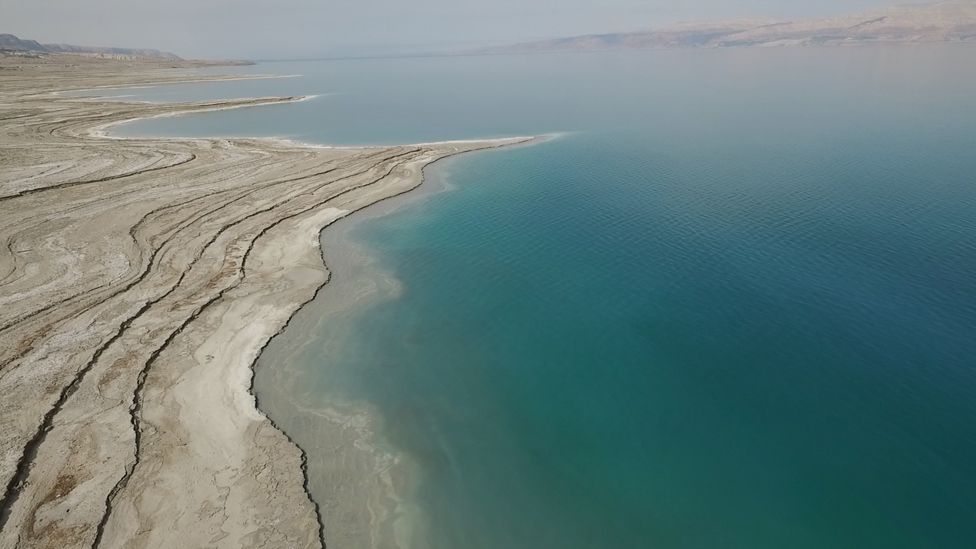[Greek] ἀσφαλίζω (asphalizō), [Latin] custodire, [Latin] strinxit: to render secure (with asphalt), to make sure, to make firm, to make fast, to fasten, to make safe; Mt. 27:64-66, Acts 16:24

The Dead Sea: The ancient Greeks called this body of water Lake Asphaltites because of its deposits of salt, asphalt, and black mud.
Background Information:
Greek Hellenism: This term is found used in a variety of ways. Examples include securing, fortifying, arresting, safeguarding, and warding off. Xenophon’s Memorabilia 6,15 states, “Whenever he himself argued out of a question, he advanced by steps, that gained general assent, holding this to be the only sure method.” A Polybius Square is an ancient Greek cryptographic device (securing hidden messages) deciphered by a vertical and horizontal series of numbers. Josephus’ “The Wars of the Jews’ states, “That with this he would build walls around Tarichea and would put the other cities in a state of security.”
The Dead Sea: The ancient Greeks called this body of water Lake Asphaltites. A black reside (asphaltum) is found at the bottom of the Dead Sea. Also called the bitumen of Judea (“Jews’ Pitch”), this residue was used by the Egyptians in the preservation of mummies. The Dead Sea also contains a black mud with potentially restorative healthful properties. Interestingly, the Dead Sea is found at 1388 feet below sea level, the lowest elevation on earth. The Dead Sea is so salty, that one can actually float on the water surface.
Old Testament: This term is found quite extensively in the Old Testament. This term means to make strong, to prevent, to be firm, to withstand, to be secure, and to support. Other more nuanced meanings include, to hold, to be sure, to harden, to hold fast, to relieve, to be courageous, and to repair. I will hard his heart so that he will not let the people go (Exo.4:4). But charge Joshua and encourage him and strengthen him (Deut.3:28). Be strong and courageous, do not be afraid or tremble at them (Deut.31:6). The king’s words prevailed against Joab and the commanders of the army (2Sam.24:4). Judgment and justice take hold of you (Job. 36:17). As for me, You uphold me in my integrity (Psa. 41:12). Let my heart hold fast My words (Prov. 4:4). Aaron and Hur supported his hands (Exod. 17:12).
New Testament: Interestingly, this term is used in a more narrowly defined sense, referring to securing a prisoner (in a prison) or securing a dead body (in a grave). The Roman authorities, fearing that Jesus’ followers would steal His body in order to perpetuate the story that Jesus rose from the dead, secured the tomb’s entrance with a seal along with guards. In Phillippi Paul and Silas were placed in prison for disturbing the peace of the Romans. This term’s related noun asphaleia, taking on more theological importance, refers to doctrinal reliability, certainty, and truthfulness.
Scripture:
“So they went and secured the tomb by fixing a seal to the stone and setting the guard.” Mt.27:66
The Roman authorities were fearful of the disciples’ stealing Jesus body to perpetuate the story that Jesus had risen from the tomb.
“When he received these instructions, he put them in the innermost cell and secured their feet to a stake.” Acts 16:24
Paul and Silas were placed in prison form disturbing the peace among the Romans.
Conclusion:
Asphalt, fall (verb), custody, custodian, strict, stretch, stringent, astringent
I was not surprised to learn that this term can be used in a variety of ways and contexts. However, it is interesting in how this term is associated with a Polybius Square, a device used to securely hide the meaning of messages.
I was surprised in learning about the Dead Sea. The Dead Sea resides at the lowest level below sea level (1388 feet below). The Dead Sea contains asphalt and a black muddy residue. It was interesting to learn that the ancient Greeks called this body of water as Lake Asphaltites. Historically, the Egyptians and Phoenicians have used this asphalt as a preservative for mummification.
I was somewhat surprised that this term (in the New Testament) is very narrowly defined being used as a means to secure someone in a prison or tomb. It is also interesting to note that doctrine (the building blocks of faith) is meant to be secure (unchanging). So we all now can understand why asphalt is black. Interestingly, this term asphalizo, which means to make sure, is the negative of the Greek verb sphallo (to fall or trip). As we all eventually find out, asphalt isn’t always secure. I am pretty “firm” in saying this the next time when your car tire falls in a pothole, where the asphalt has been worn down.
